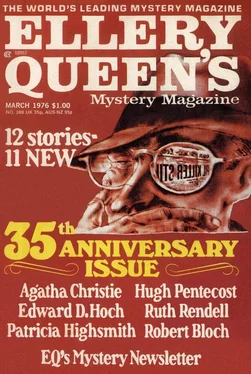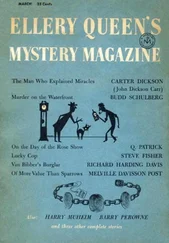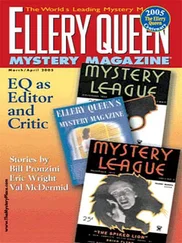Аврам Дэвидсон - Ellery Queen’s Mystery Magazine. Vol. 67, No. 3. Whole No. 388, March 1976
Здесь есть возможность читать онлайн «Аврам Дэвидсон - Ellery Queen’s Mystery Magazine. Vol. 67, No. 3. Whole No. 388, March 1976» весь текст электронной книги совершенно бесплатно (целиком полную версию без сокращений). В некоторых случаях можно слушать аудио, скачать через торрент в формате fb2 и присутствует краткое содержание. Город: New York, Год выпуска: 1976, Издательство: Davis Publications, Жанр: Детектив, на английском языке. Описание произведения, (предисловие) а так же отзывы посетителей доступны на портале библиотеки ЛибКат.
- Название:Ellery Queen’s Mystery Magazine. Vol. 67, No. 3. Whole No. 388, March 1976
- Автор:
- Издательство:Davis Publications
- Жанр:
- Год:1976
- Город:New York
- ISBN:нет данных
- Рейтинг книги:5 / 5. Голосов: 1
-
Избранное:Добавить в избранное
- Отзывы:
-
Ваша оценка:
- 100
- 1
- 2
- 3
- 4
- 5
Ellery Queen’s Mystery Magazine. Vol. 67, No. 3. Whole No. 388, March 1976: краткое содержание, описание и аннотация
Предлагаем к чтению аннотацию, описание, краткое содержание или предисловие (зависит от того, что написал сам автор книги «Ellery Queen’s Mystery Magazine. Vol. 67, No. 3. Whole No. 388, March 1976»). Если вы не нашли необходимую информацию о книге — напишите в комментариях, мы постараемся отыскать её.
Ellery Queen’s Mystery Magazine. Vol. 67, No. 3. Whole No. 388, March 1976 — читать онлайн бесплатно полную книгу (весь текст) целиком
Ниже представлен текст книги, разбитый по страницам. Система сохранения места последней прочитанной страницы, позволяет с удобством читать онлайн бесплатно книгу «Ellery Queen’s Mystery Magazine. Vol. 67, No. 3. Whole No. 388, March 1976», без необходимости каждый раз заново искать на чём Вы остановились. Поставьте закладку, и сможете в любой момент перейти на страницу, на которой закончили чтение.
Интервал:
Закладка:
“No, Stella dearest. You don’t understand. I guess I’ve never really told you how much I’ve always wanted to have season tickets to the football games. And now I’ve got them. And we won’t have to miss a single game. Isn’t that wonderful? I think I’ll go get myself a beer.”
Francis cavorted out into the kitchen. Stella heard the refrigerator door slam, and the old familiar hissing pop of the easy-open beer can. Football! He’d never mentioned football. If anything, football was worse than baseball. All those hulking great bodies charging up and down a muddy field. Sitting in the stands, cold and damp, with her fingers too chilled to knit. And all that noise. Oh, no! How could he do this to her? And what about their trip?
Stella marched determinedly into the kitchen. Francis was sitting at the kitchen table poring over a schedule and sipping from a can.
“What about our trip? And the least you could do is pour that disgusting beer into a glass!”
“Stella, dearest,” soothed Francis. “Have I done something to disturb you? You seem suddenly so discontent. You know I can’t bear to have you emitting waves of displeasure. It upsets my own balance of contentment, and just when I’m feeling so eternally grateful to you. Please don’t spoil it for both of us.”
“But what about our trip?” she asked again. “I’ve just about got things lined up and we could leave next month if all goes well.”
“Yes, but don’t you think we could postpone it just a little bit longer? After all, we’ve already been delayed and it would be much more pleasant to travel in the springtime. Don’t you think?”
“Oh, I see,” said Stella, clamping her jaw shut on all the vicious malcontented words struggling to leap off her tongue. Oh, I could kill him, she raged inwardly. Bean him with his precious football, bop him with a goalpost, punt him over the moon. But none of these measures seemed even remotely feasible.
Stella turned and marched out of the kitchen. Resolutely, she climbed the stairs, muttering to herself.
“Just you wait, Francis X. Lafferty. Dear Francis. Just you wait. It’s going to be my turn next. I’m going to be the next season ticket holder around here.”
She smiled as she remembered her recent prowess with a baseball bat. It could have been beginner’s luck, but then again maybe she was just a natural athlete. She would get the next set of season tickets, and she would watch the players carefully.
“And then, dearest Francis,” she murmured, “we’ll just see what a novice can do with a hockey puck.”
Sing a Song of Sixpence
by Agatha Christie [8] Copyright 1947 by The American Mercury, Inc.; renewed.
One of the best Agatha Christie nonseries detective stories — that is, about a detective who has appeared only one time in an Agatha Christie story (thus ruling out Hercule Poirot, Tommy and Tuppence Beresford, Harley Quin, Miss Jane Marple, and Parker Pyne). In this instance it is Sir Edward Palliser, K.C., a retired criminal lawyer who once — so long ago, it seemed to Sir Edward — made a promise to a beautiful young girl. And when that girl, now grown up, became a damsel in distress, Sir Edward became a knight in shining armor — to go forth and give battle to the Dragon of Murder ...
Sir Edward Palliser, K.C., lived at No. 9 Queen Anne’s Close. Queen Anne’s Close is a cul-de-sac. In the very heart of Westminster it manages to have a peaceful old-world atmosphere far removed from the turmoil of the twentieth century. It suited Sir Edward Palliser admirably.
Sir Edward had been one of the most eminent criminal barristers of his day and now that he no longer practiced at the Bar he had amused himself by amassing a very fine criminological library. He was also the author of a volume of Reminiscences of Eminent Criminals.
On this particular evening Sir Edward was sitting in front of his library fire sipping some excellent black coffee, and shaking his head over a volume of Lombroso. Such ingenious theories and so completely out of date.
The door opened almost noiselessly and his well-trained manservant approached over the thick pile carpet, and murmured discreetly, “A young lady wishes to see you, sir.”
“A young lady?”
Sir Edward was surprised. Here was something quite out of the usual course of events. Then he reflected that it might be his niece, Ethel — but no, in that case Armour would have said so.
He inquired cautiously. “The lady did not give her name?”
“No, sir, but she said she was quite sure you would wish to see her.”
“Show her in,” said Sir Edward Palliser. He felt pleasurably intrigued.
A tall dark girl of close on 30, wearing a black coat and skirt, well cut, and a little black hat, came to Sir Edward with outstretched hand and a look of eager recognition on her face. Armour withdrew, closing the door behind him.
“Sir Edward — you do know me, don’t you? Pm Magdalen Vaughan.”
“Why, of course.” He pressed the outstretched hand warmly.
He remembered her perfectly now. That trip home from America on the Siluric. This charming child — for she had been little more than a child. He had made love to her, he remembered, in a discreet, elderly man-of-the-world fashion. She had been so adorably young, so eager, so full of admiration and hero-worship — just made to captivate the heart of a man near 60. The remembrance brought additional warmth into the pressure of his hand.
“This is most delightful of you. Sit down, won’t you.” He arranged an armchair for her, talking easily and evenly, wondering all the time why she had come. When at last he brought the easy flow of small talk to an end there was a silence.
Her hand closed and unclosed on the arm of the chair as she moistened her lips. Suddenly she spoke — abruptly.
“Sir Edward, I want you to help me.”
He was surprised and murmured mechanically, “Yes?”
She went on, speaking more intensely, “You said that if ever I needed help, that if there was anything in the world you could do for me, you would do it.”
Yes, he had said that. It was the sort of thing one did say — particularly at the moment of parting. He could recall the break in his voice, the way he had raised her hand to his lips.
“If there is ever anything I can do — remember, I mean it ... ”
Yes, one said that sort of thing... But very, very rarely did one have to fulfill one’s words! And certainly not after — how many? — nine or ten years. He flashed a quick glance at her — she was still a very good-looking girl, but she had lost what had been to him her charm — that look of dewy untouched youth. It was a more interesting face now, perhaps — a younger man might have thought so — but Sir Edward was far from feeling the tide of warmth and emotion that had been his at the end of that Atlantic voyage.
His face became legal and cautious. He said in a rather brisk way, “Certainly, my dear young lady, I shall be delighted to do anything in my power — though I doubt if I can be very helpful to anyone in these days.”
If he was preparing his way of retreat she did not notice it. She was of the type that can only see one thing at a time and what she was seeing at this moment was her own need. She took Sir Edward’s willingness to help for granted.
“We are in terrible trouble, Sir Edward.”
“ We? You are married?”
“No — I meant my brother and I. Oh, and William and Emily, too, for that matter. But I must explain. I have — I had an aunt — Miss Crabtree. You may have read about her in the papers? It was horrible. She was killed — murdered.”
Читать дальшеИнтервал:
Закладка:
Похожие книги на «Ellery Queen’s Mystery Magazine. Vol. 67, No. 3. Whole No. 388, March 1976»
Представляем Вашему вниманию похожие книги на «Ellery Queen’s Mystery Magazine. Vol. 67, No. 3. Whole No. 388, March 1976» списком для выбора. Мы отобрали схожую по названию и смыслу литературу в надежде предоставить читателям больше вариантов отыскать новые, интересные, ещё непрочитанные произведения.
Обсуждение, отзывы о книге «Ellery Queen’s Mystery Magazine. Vol. 67, No. 3. Whole No. 388, March 1976» и просто собственные мнения читателей. Оставьте ваши комментарии, напишите, что Вы думаете о произведении, его смысле или главных героях. Укажите что конкретно понравилось, а что нет, и почему Вы так считаете.












